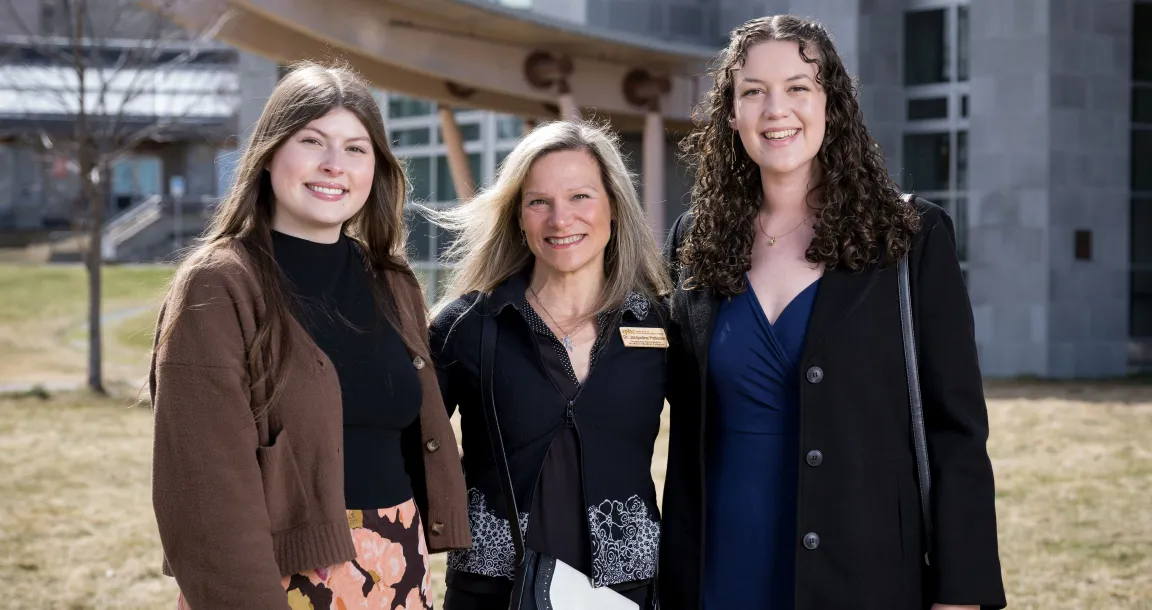DMS associate professor and students investigate Vitamin D impact on young adults
With funding from a DMS Catalyst Grant, Dr. Jacqui Pettersen, together with then students Jenna Rea (UNBC undergrad) and Katherine Bailey (NMP), undertook a study to investigate if vitamin D insufficiency occurs in high-functioning young adults.

When UBC Northern Medical Program (NMP) associate professor Dr. Jacqui Pettersen thinks about brain health in northern populations, she doesn’t just consider neurology—she considers nutrition.
Over the past decade, her research has explored the importance of vitamin D on healthy brain function and optimal cognition, and one of her most recent studies drew in both a NMP student and an undergraduate student from the University of Northern British Columbia (UNBC).
“My previous work has shown that vitamin D insufficiency is common among young adolescents and older adults in our region,” says Pettersen, who is also a faculty member with UBC’s Division of Neurology, Department of Medicine, “and that lower levels are linked to worse cognitive functioning.
“For this latest research, we wanted to know if vitamin D insufficiency is also common among high-functioning young adults, such as university students, and if there is any association with suboptimal cognitive functioning in these individuals who are likely at their cognitive peak.”
With support from Dr. Tammy Klassen-Ross, a senior instructor in UNBC’s School of Health Sciences, Pettersen mentored two students, Katherine Bailey, then a fourth-year NMP student who is now a resident physician, and Jenna Rea, an honours psychology student who graduated in May.
The project was funded through a competitive Catalyst Grant from the Division of Medical Sciences at UNBC, which hosts the Northern Medical Program.
For Rea, who grew up in the North, the project connected directly to her career interests and her community.
“I really wanted to work on a project where I got hands-on experience working with participants,” notes Rea. “Furthermore, I am a young adult who has grown up in the North, so studying the relationship between cognition and vitamin D in this population was very relevant to me personally.”
Bailey had previously worked with Pettersen on her School of Health Sciences undergraduate Honour’s research project, which looked at Vitamin D and young adolescents.
“In my Honour’s project, we showed that vitamin D levels were significantly associated with visual memory, in that those with higher levels, did better,” she recalls. “This work was presented at the American Academy of Neurology annual meeting in 2022 and published in the journal Nutritional Neuroscience in 2023.”
The new study, involving both Jenna and Katherine, revealed that vitamin D insufficiency was common even among university students and that those with lower levels performed worse on immediate recall tasks involving words and numbers.
“Our finding that immediate recall of words and digits was most linked with vitamin D levels was a bit of a surprise to us,” says Pettersen. “Given the importance of optimal cognitive functioning for students in university, these results suggest that adequate intake of vitamin D should become a priority.
“For those living in the north, where vitamin D cannot be synthesized in the skin from the sun for several months of the year, the study shows that it could be very helpful to take vitamin D supplementation in moderate doses.
The research opportunity proved to be an invaluable learning experience for Rea and Bailey.
“It honestly meant the world for me to get the opportunity to be involved in a research project like this as an undergraduate student,” says Rea. “Working on this project helped me learn so much valuable information that I know will be extremely useful as I further my education and in my future career.”
“The continuity of working with Dr. Pettersen across multiple projects allowed me to apply the skills I had developed under her supervision in new ways,” notes Bailey. “Through this work, I gained not only technical research skills but also a deeper appreciation for how mentorship and continuity can foster meaningful academic and clinical growth.”